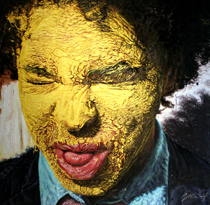Blacks on the Border: The Black Refugees in British North America, 1815-1860
By Amani Whitfield
Burlington, VT: University of Vermont Press, 2006
200 pp. $24.95
Harvey Amani Whitfield’s history, Blacks on the Border: The Black Refugees in British North America, 1815-1860, is one of those books that one promises oneself to read – “as soon as possible†– but, then, one never seems to find enough time…. Until, at least for me, the War of 1812 bicentennial rolls around, and one is asked to give fresh attention to the Black Refugees. So, though I’ve held this book proudly in my possession since 2006, it is only now that I am able to provide this assessment: It is a fine study, especially because it is written for the plain reader and is not festooned with charts specifying numbers, dates, and percentages.
No, Whitfield writes history as an informed storyteller, not as a remote scientist, and so he brings to life, dexterously, the context and the complexity of the 2,000 or so African Americans who, as a result of a war policy, found themselves “liberated” by British forces and dispatched to Nova Scotia between 1812-1815. His work serves an ongoing effort to overturn the propaganda that has besmirched the reputations of the Black Refugees – and, by extension, all African-Nova Scotians (or Africadians) right down to the present. That mythology holds that the Black Refugees had few skills, would not farm or work, and were utterly illiterate, and so “worthless,” in effect, that they were only good for slavery, and should have been shipped to the U.S. South, or to Trinidad, or to Sierra Leone, as soon as funds could have been raised for their transport.
No less a personage than Thomas Chandler Haliburton, colonial Nova Scotia’s great author, made like arguments in Sam Slick sketches, in political statement, and in his History of Nova Scotia (1829), where he holds that the ex-slaves “sighed for the roof of their master, and the pastimes and amusements they left behind.†In the 1970s, one scholar held that the Black Refugees were so destitute that they didn’t even possess a heritage of song and music. Other scholars felt that, once the “cream†of the Black Loyalists shipped to Sierra Leone in 1792, the Africadian communities, “old†and “new,†were left leaderless and felt listless, and that the refugee blacks, arriving poor and hungry and cold, only added to the common woe.
Through searching newspaper articles and other contemporary records, Whitfield reminds us of some facts: The Black Refugees were given, in essence, squatting privileges on tiny, unsustainable plots of poor soil that nobody could farm; even when they could try their hands at agriculture, they needed new skills to go with the new crops that they found in Nova Scotia; they arrived in Nova Scotia to a poor economy, an I’ll-prepared government, and a hostile public. That they starved, froze, and went begging was the consequence of the miserable land that had been deliberately allotted to their subsistent sustenance.
Yet, Whitfield shows, they evolved coping strategies. First, they protested and petitioned, over 40 years, for actual ownership of more – if not arable – plots of land. This maneouvre served to develop a land-base that, if not good enough for economic independence, was good enough to sustain a sense of community and separate culture.  In practice, the colonial Africadians identified liberty with land ownership; owning land – even a patch of scrub – allowed one the pleasure of feeling rooted in a community, while one also worked, perhaps, “in town†or in the non-Nova Scotian world. But they also created institutions – the African Baptist Church, the African Methodist Church, the African Abolition Society, etc. – that fostered a modicum of political, religious, and communal activism. And they brought forth leaders – Rev. Richard Preston, the great orator (a worthy match to Joe Howe, some said)—and the military hero, William Hall, V.C. I have said elsewhere that the first Africadians sought “liberty, land, ‘ligion, and literacy.†Whitfield’s study cements me in that view. I also agree with Whitfield – and Prof. James Walker – that the Black Refugees developed a distinct identity, simultaneously African American and British, and that dual connection continues, even if “British†has been replaced by “ Canadian.â€
I’m less convinced by Whitfield’s musings on African-Canadian identity. Here the complexity of Canadian regionalism perplexes the African-American professor of history at the University of Vermont. But one possible answer is, there isn’t only one African-Canadian identity, but a polyphony of heritages. Still, whatever Africadia is, it is indebted to the struggles and successes of the Black Refugees.






Hi Professor Clarke,
It’s been a long time since Modern Canadian Poetry! I wanted to ask you a question about your opening line- perhaps it’s more about defining mystical and intellectual from a poetic perspective-
How do you define the poetry of Rumi, Hafez and other sufi poets? They defy the ‘intellectual’ term– would you call them ‘mystical’ or ‘sentimental’- or are they accessible enough to not be defined as either ‘intellectual’ or ‘mystical’, despite being rooted in a mystical tradition?
Hope you’re doing really well!